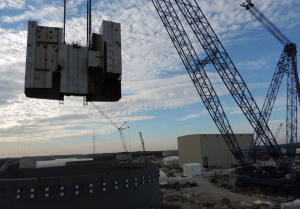
Under these circumstances, it’s hardly a surprise that nuclear plants won’t be left out of the government plan for the electrification the country. On November 30 2011, the Minister of State-owned enterprises of Indonesia, Dahlan Iskan formally adopted a long-term plan for the development of nuclear energy in Indonesia. While being mindful of the recent accident at the Japanese nuclear power plant Fukushima-1, a few days after the adoption of the program the director of research at the National Atomic Energy Agency of Indonesia (BATAN), Tasvanda Tario released a statement, where he emphasized the special attention that would be paid to security issues. The director of research is convinced that when a location for the construction of a nuclear power plant is chosen wisely and adequate technologies are used there’s nothing to fear.
In terms of seismic safety Indonesia is a pretty troublesome location, since it’s situated in the zone with the most active volcanoes on the planet and frequent earthquakes. Therefore, one can successfully construct a nuclear power plant in Indonesia only if he puts it outside of the so-called Ring of Fire. The government commission established that the islands of Kalimantan and Java, along with eastern regions of Sumatra are pretty safe in terms of possible seismic risks.
The Indonesian government has considered all the options. The Java project has already been turn down due to the protests of the local population. The project to build nuclear power plants on the island of Kalimantan has been carefully studied for 5 years now. This island fits not only because of the absence of earthquakes, but also due to the presence of large uranium deposits on it. In 2014, it was reported that BATAN appealed for help in the construction of nuclear power plants in Kalimantan to the company Terra Power, led by the founder of Microsoft Bill Gates. However, so far negotiations have given no result.
As of now, the only successful step on the path to nuclear power has been achieved on the islands of Bank and Belitung. According to the recent statements made by the Government of Indonesia, by 2025 first Indonesian nuclear power plants are to be erected on those islands, and Russia is going to take part in the construction.
One should be mindful of the fact that nuclear power requires huge financial investments and the highest level of technology. In the absence of their own experience, Indonesians attract foreign partners. So far, Jakarta has been pretty successful in negotiating its projects with Russia. In January 2015 Russia’s Ambassador to Jakarta Michael Galuzin announced that Russia is willing to provide its assistance and expertise to Indonesia in the construction of nuclear power plants.
However, any concrete decisions on the construction of nuclear power plants by Russian companies are yet to be made. So far the closest to the actual implementation in the long list of Indonesian-Russian possible projects is the construction of the high temperature gas cooled reactor. By now Indonesia has already had three experimental nuclear reactors. In 2015 a consortium of Indonesian and German companies (indirectly owned by Russia’s Rosatom) has won the tender for the preparation phase of a nuclear plant construction. The execution of this project was given to the company Africantov that is also owned by Rosatom. Now Indonesia is going to hold a tender for the construction of the reactor itself, after which the work will start.
Another direction of nuclear development that Indonesia may be interested in is the creation of floating nuclear power plants, and Russia is a strong contender in this area too. In the summer of 2015 the corresponding letter of intent was signed between the two countries. Such a letter does not bind the parties to make any financial or legal obligations, but it can be considered a first step towards full cooperation.
One of the most important aspects of nuclear energy is the nuclear fuel cycle (NFC). Only if a competent approach towards the safe fuel operation is taken, one can sleep calmly at night. The NFC comprises all the steps from the fuel production at uranium mines to its use and the subsequent burial or reusage of uranium. Again, among the possible partners in this area Indonesia will most likely choose Russia. In December 2015, Jakarta held a major seminar on Russian nuclear technologies, organized by BATAN and Rusatom. It was stated that Russia appreciates the interest towards its technology and is ready to provide its expertise to ensure the efficiency and safety of the nuclear fuel cycle on Indonesian nuclear plants.
Summing up the above stated facts, one can draw two important conclusions. Indonesia has seriously decided to develop nuclear energy sources, and out of all the states possessing advanced nuclear technologies, it gives a clear preference to Russia. This reflects both the high competitiveness of Russian technologies in the world market, and the fact that Russia has a chance to significantly increase its influence in the ASEAN region, since a successful implementation of a nuclear energy project requires two countries to establish a partnership with strong economic and political ties.
Dmitry Bokarev, political observer, exclusively for the online magazine “New Eastern Outlook”.
